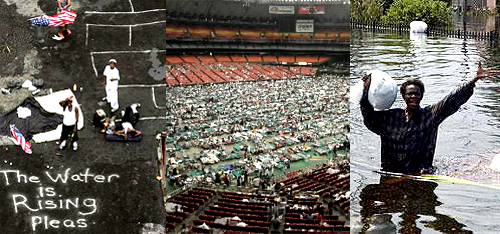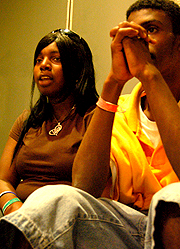
Two New Orleans Teenagers Tell Their Story of Survival and Loss
AUSTIN, TEXAS—Nearly 200,000 school-age children have been evacuated from the floods in New Orleans, and are starting school in cities around the country this month. Abruptly integrated into new communities, these young New Orleanians bring a rich cultural history and incredible stories of survival, loss, and heroism to their new classrooms. They also bring a constellation of issues—from post-traumatic stress disorder to grief and cultural dislocation—that need special care, resources, and attention from the teachers and youth workers.
What Kids Can Do writer Abe Louise Young interviewed two teenagers evacuated from New Orleans to Texas last week. Cleo, 17, and Bradley, 16, sat on the steps of a large emergency shelter in downtown Austin, and discussed their experiences surviving the storm. Both teens are strong, resourceful, and trying to stay positive. But these students have come through a disaster that most Americans cannot fathom. Cleo saved her small cousin's life by carrying the toddler on her back as she swam through toxic floodwaters. Bradley risked death to seek food for his stranded family, when martial law called for anyone stealing to be shot on contact. Both lived without food or water for more than five days, and felt the helpless fury of being ignored by police and the National Guard. A day before we spoke, Cleo learned that her father and three siblings had drowned—and that the fate of her grandmother was yet unknown.
At the time of this interview, they were trying to put their lives back in order, take care of family members, and get from day to day. The conversation, reprinted below, reveals excitement over their new schools, a grief too large to even cry over, the pressures they're coping with, and their hopes for the future.
On weekdays, Bradley now rises early from his spot in the vast hall of pallets, cots, and inflatable beds to board the schoolbus to MacCallum Arts High School in Austin. Cleo is still waiting to register, and caring for family members in the absence of her mother and father.
The education they'll receive in Austin will almost certainly exceed what was available in New Orleans Public Schools—a system plagued by poverty, violence, crumbling facilities, and low academic performance. As they adjust to new classmates, cultures, and surroundings, many aspects of their new environment will challenge all involved. But their enthusiastic response to their new schools is a bright spot in a dark journey.
What Kids Can Do is grateful to Cleo and Bradley for sharing their stories.
 In their own words
In their own words
Bradley: My new school's bigger—way bigger. They got two weight rooms, they got a football, baseball, and softball field, three different fields, swimming team, wrestling team. We didn't have no wrestling team in New Orleans.
Cleo: We didn't have swimming team either. And the basketball players and the tennis players had to play in the same court. And we had to wait our turn and stuff, that was irritating.
Bradley: We got two gyms. We can take bowling for a class. That's why I like that school! Take basketball for a class, football for a class. And now I'm taking French. I only know oui, oui, but now...that means yes. [Laughter] The only word I know! I figured I might as well sign up for French because I know one day I wanted go to Paris. I wanted to understand what they was saying!
Cleo: I like writing stories about myself. That's fun. I just write stories—crazy little stories about myself. Like daily stories like what happened, and I add some extra stuff in it, to make it seem exciting or something. In New Orleans all I used to do was sit inside and talk on the phone and eat popcorn. I like popcorn.
Bradley: I don't usually have time to watch TV. School, football practice, and work. I used to work at a Sonic. Looking for another job now. I'll work back in the fast food, me. It's easy; I'm just trying to pay a little bills for my mama. My mama's doing good now. She's here, I think she asleep right now. Getting her rest.
Cleo: We waited a long time to get here.
Bradley: Too long. Too long. It took me a week to get here.